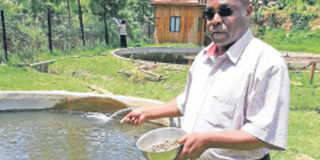I rejected tilapia for trout and have no regrets so far

Mr Gachucha feeds the trout fish at his farm. PHOTO | BONIFACE MWANGI | NATION MEDIA GROUP
What you need to know:
- Mr Collins Maina, an expert in trout fish who takes care of Gachucha’s Trout Valley Farm, says by denying the fish food, they produce less heat, hence keeping them going until the weather cools off.
- The farm also supplies several hotels in Nyeri. In a month, Mr Gachucha says he sells 245 trout fish, making at least Sh245,000.
- Maina acknowledges trout fish farming is labour intensive and expensive. Trout feed on pellets. A 50kg bag of pellets goes for Sh6,000.
It is a bright sunny Wednesday morning in Tetu, Nyeri County. In his homestead, Mr Gichohi Gachucha is keenly monitoring his farm hand feeding the trout fish in one of his five ponds.
Gachucha, a retired government radiologist, started rearing trout fish two-and-a-half years ago. It has not been easy activity as trout require water with a temperature of between 10 to 18 degrees Celsius.
“I have an advantage as my trout fish farm is near the Aberdare Forest, where temperature ranges from 11 to 15 degrees Celsius,” he says. And when waters exceed the required temperature, especially in the months of January and February, his fish are fed twice a day, sometimes once a day.
Mr Collins Maina, an expert in trout fish who takes care of Gachucha’s Trout Valley Farm, says by denying the fish food, they produce less heat, hence keeping them going until the weather cools off.
However, when the water attains cools, they resume feeding the fish thrice a day.
At the same time, trout fish require clean, fresh water. Gachucha’s farm is adjacent to River Chania. He has tapped the river water using gravity to provide a constant flow of clean water into his concrete fishponds.
A table size trout fish, which weighs 250 grammes, takes nine to eleven months to mature.
Gachucha started off with 7,000 fingerlings that he bought from the government breeding farm at Sagana Fisheries at Sh45 each fingerling. All grew well and reached maturity.
The 57-year-old father of three says he chose trout fish farming because everyone else had opted for tilapia and catfish rearing.
“Although labour intensive and expensive to rear, trout returns are appealing,” he says.
His five ponds are on a half-acre piece of land, where he has also constructed a restaurant.
“We serve well done trout fish at an affordable price of Sh1,000 per plate. We started doing this when we realised that many people did not like eating fish since they didn’t know how to prepare it,” says Mr Gachucha.
The farm also supplies several hotels in Nyeri. In a month, Mr Gachucha says he sells 245 trout fish, making at least Sh245,000.
“There is a huge demand for trout fish, but the supply is low,” he says.
Apart from selling trout, the entrepreneur allows sport fishing on his five ponds at a fee.
Gachucha also wants to team up with the government, through the ministry of Fisheries, to stock trout fish in some of the rivers in Mt Kenya and Aberdare to promote sport fishing and boost tourism.
Although he has been restocking his ponds with fingerlings bought from Sagana Fisheries, he has completed constructing nine raceways where he wants to start stripping eggs from his fish. The nurseries will provide fingerlings for his ponds and for other farmers.
Maina acknowledges trout fish farming is labour intensive and expensive. Trout feed on pellets. A 50kg bag of pellets goes for Sh6,000.
“This bag doesn’t last long since a fish consumes two to three per cent of its body weight in a day,” he says. To keep predators away, they have fenced off the farm with wire mesh and kuku chain. The most difficult predators to keep away have been birds like the hammercop and kingfisher.
Maina says he has to ensure there is always someone around the ponds during day to scare the birds away.




